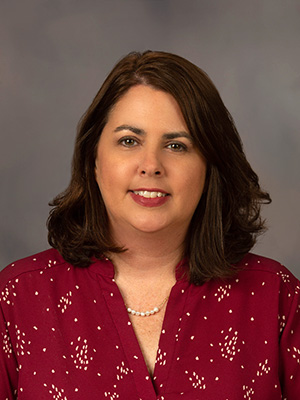Nurse educator graduates pass the CNE exam

Associate Professor and
Director of the Nurse Educator track
The School of Nursing's nurse educator master’s degree track within the graduate program prepares students to serve as expert health agency educators and as faculty members in a nursing education program. In recent years, the program has experienced growth and continues to attract nurses desiring to become nurse faculty.
The program's growth is encouraging news as Mississippi and the nation face a nursing faculty shortage. The lack of faculty compounds the nursing workforce shortage by limiting the number of students that nursing programs are able to accept at the community college and university levels (AACN, 2022). The curriculum is framed around the American Association of Colleges of Nursing (AACN) Essentials for graduate education and core competencies developed by the National League for Nursing (Halstead, 2019).
Nurse educator students develop the skills and knowledge to effectively plan, implement, and evaluate educational programs in the clinical or academic setting. With a focus on the academic role, students are provided with experiences in the classroom, clinical, and simulation settings during three practicum courses.
Graduates of the nurse educator track are able to transition smoothly into a faculty position at an associate degree or baccalaureate degree program after graduation. The academic nurse educator role is recognized as a specialty area of practice by the NLN who offers a certification exam for nurse educators to demonstrate their expertise. To be eligible to sit for the Certified Nurse Educator (CNE®) exam, the applicant must meet certain criteria such as having a master’s or doctoral degree with a major emphasis in nursing education (NLN, 2022). Although not a requirement for graduation or faculty employment, nurse educator graduates have recognized the importance of this certification and have started sitting for the exam after completing the program.
Three recent graduates, Rachel Gambill, instructor at UMMC School of Nursing (2020 graduate), Kelley Willard, instructor at Delta State University Robert E. Smith School of Nursing (2021 graduate), and Melissa McBride, instructor at UMMC School of Nursing (2021 graduate), have passed the CNE® exam.
Willard stated, “I definitely feel like [the nurse educator track] courses at UMMC prepared me.” Fifteen of the recent eighteen December 2022 graduates indicated they planned to take the CNE exam at some point.
The nurse educator track accepts students in the summer, fall, and spring semesters. For more information about the nurse educator track, you may contact the nurse educator track director via email.
American Association of Colleges of Nursing. (2022, October). Nursing faculty shortage. https://www.aacnnursing.org/news-information/fact-sheets/nursing-faculty-shortage
Halstead, J.A. (2019). NLN core competencies for nurse educators: A decade of influence. National League for Nursing.
National League for Nursing (NLN). (2022). Certified nurse educator (CNE®) https://www.nln.org/certification/Certification-for-Nurse-Educators/cne


